On January 2020, Russia introduced a temporary restriction on the supply of citrus fruits from China to Russia and the restriction is still in place. Russian importers must import from other sources, which gives the Vietnamese pomelo sector a great opportunity.
Mr Siebe van Wijk is the owner of the Vietnamese fruit exporter, The Fruit Republic (TFR). He shared with us his expectations for the current season and his insights into the development of the local pomelo sector.
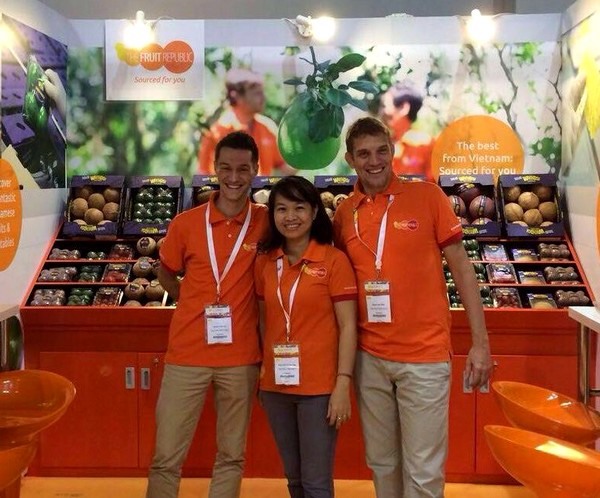 Export Sales Manager Jeroen (left), Domestic Sales Director Ms Hiep (middle), and General Manager Siebe van Wijk (right)
Export Sales Manager Jeroen (left), Domestic Sales Director Ms Hiep (middle), and General Manager Siebe van Wijk (right)
What is the consequence of the Russian ban on Chinese citrus?Russia is one of the major export destinations for Chinese pomelos. Every year, the country receives about 5,000 containers of pomelos from China. Normally the export from China starts in week 36 and products arrive in Russia by week 40, and the sales season ends around week 8. As, this season, Chinese citrus fruits are temperately banned from entering the Russian market, Russian importers have started to turn their eyes to countries like Thailand, Myanmar, Malaysia and Vietnam.
“However, I do not think the overall export volume to Russia will be as big as people expect.” First of all, the total available volume of export class pomelo fruits in Vietnam is much smaller. Secondly, an export program needs to be well prepared, at least six to nine months in advance. Although the Russian ban on Chinese citrus started almost 9 months ago, Russian importers have only recently started contacting Vietnamese suppliers. Thus, the fruits that meet Russian import conditions are further limited.
"Thirdly, Russian importers do not have much knowledge about the Vietnamese pomelo. They first thought the pomelo from Vietnam would be even cheaper than from China. When these importers found out that the export price is almost 3 times higher than Chinese pomelo, many of them were a bit shocked. This price difference is caused by the strong Vietnamese domestic market for pomelo and the relatively low percentage of export grade fruits.
"Vietnamese consumers see pomelo as a very healthy fruit, with high vitamin C and they believe the fruit helps to reduce your body fat percentage. “These higher prices will dampen the demand from the Russian market, as, in the end, Russian consumers can only spend a certain percentage of their income on fruits and they will compare the Vietnamese pomelo with prices of other citrus”. Siebe said.
"But one element will surprise the Russian consumers, and this is the great taste of the Vietnamese pomelo. The variety is called Nam Roi, and is a different variety from the Chinese pomelo. Maybe the price is higher, but the juicy Vietnamese pomelo will give consumers a lot more value."
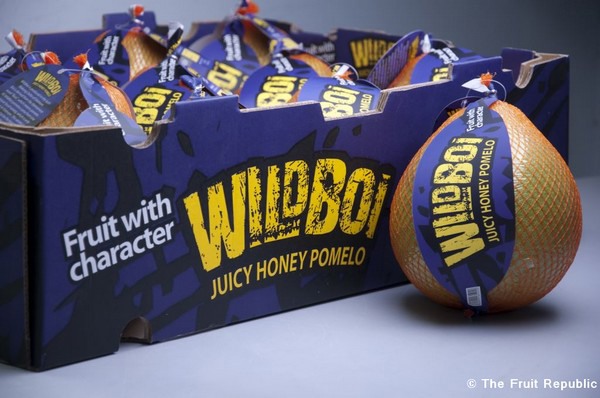 Juicy honey pomelo
Juicy honey pomelo
The European market sets high standards for Vietnamese pomelos
The Fruit Republic focuses on clients who want the nicest tasting pomelo year-round on their shelves. Besides the domestic market, these clients are mostly based in Europe. But the Chinese ban, for sure provides a chance for the Russian market to discover the Vietnamese pomelo. After the Russians have fallen in love with the taste, Siebe is sure that great tasting Vietnamese pomelo programs can be developed. Not as large as the Chinese programs, but a nice niche for the Russian pomelo lover is possible.
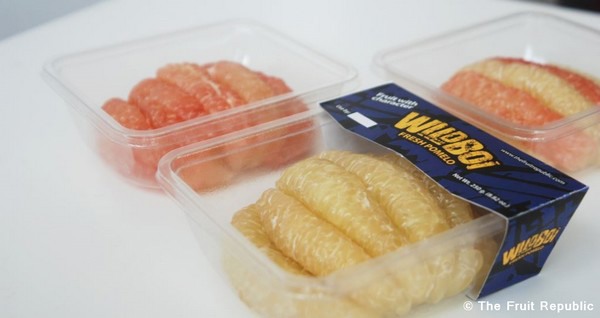 Fresh cut pomelo
Fresh cut pomelo
“The European market has one of the highest standards for imported products when it comes to fruit quality, agro-chemical control, product sizing, packaging, certifications, traceability and compliance with social standards. The Vietnamese pomelo farms are beautiful, but as the trees are very large and tall, it is hard to manage the skin quality of the fruits well. As a result of this, there is quite some scarring. As most pomelo lovers know, a bit of scarring is no issue, as the pomelo skin is so thick. But for critical European and Russian supermarket chains this can be a reason for rejection.
"If you want to work well with local Vietnamese pomelo farmers, you need to have the right sales channel for every pomelo class. The local market for example loves big fruits, ideally with a small branch with leaves still attached to the fruit. These pomelo’s get premium prices, which no export market can offer. Other markets want the small pomelo sizes, as the price per fruit will be relatively lower. TFR uses the fruits with the lowest skin class to produce fresh cut pomelo. The ultimate convenience fruit snack. The skin might be scarred, but often these are the sweetest and best tasting pomelo. TFR has a BRC grade 1 certified high care facility for producing these fresh cut pomelos."
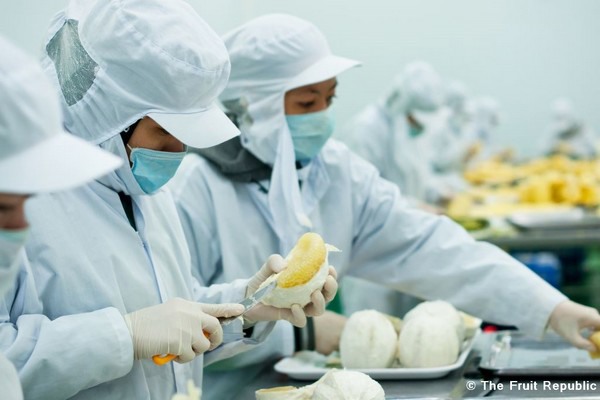 Pomelo processing factory in Vietnam
Pomelo processing factory in Vietnam
The Mekong River Delta is the main production region of the Vietnamese pomelos. The pomelo trees benefit from the water of the Mekong River, a nice warm tropical climate, and rich clay soils. The pomelos grown in this region have a very nice smell, are very juicy with a lot of taste. Fruits are harvested during two main harvest periods per year, but through the year we still can harvest weekly so we can supply the freshest pomelo to overseas importers all-year round.
Professionalizing the pomelo sector
In the coming years a lot of works need to be done to further professionalize the Vietnamese pomelo sector. The first-generation pomelo farmers just started to grow pomelo in the early nineties when they switched from rice to pomelo. These were mostly smallholders with a 0.5 to 1 ha of land. These farmers planted too many trees per hectare, as they thought this would give the best result. Now a new generation of farmers is needed, who will setup the orchards in a different way, so that there is better spacing between the trees, which will make it easier to manage the fruits, increase the yields and percentage of class 1 fruits.
The Fruit Republic is implementing a special five-year program to support pomelo farmers to professionalise their farms. This program will reduce agro-chemical use and at the same time increase farmer income. Combining local experience with citrus expertise from other experienced citrus growing countries like South Africa, the USA and Spain is what the Vietnamese pomelo sector needs. “We welcome applications from citrus production experts from anywhere in the world, to join our passionate TFR team and develop the Vietnamese citrus farmers”.
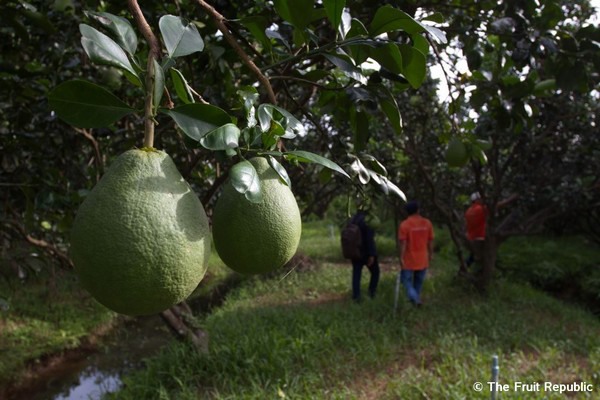
The Fruit Republic staff working in the pomelo orchard
The Fruit Republic
Established in 2009, The Fruit Republic developed into the leading fresh produce company of Vietnam. Through its own Globalgap/GRASP/ETI certified contract farmer programs, two HACCP and BRC certified packhouses and one BRC certified fresh cut facility, The Fruit Republic is supplying the booming Vietnamese domestic market of 100 million people with a portfolio of top quality fruit and vegetables.
TFR’s domestic brand Mekostar, is the no 1 brand on the fruit and vegetable shelves of supermarkets in Vietnam. On top of this, The Fruit Republic has year-round export programs for citrus and exotics to the European and Australian markets.
"Our mission is to let the world discover the fantastic taste of Vietnamese fruit and vegetables and make Vietnamese consumers proud again of their home-grown produce." Siebe said.
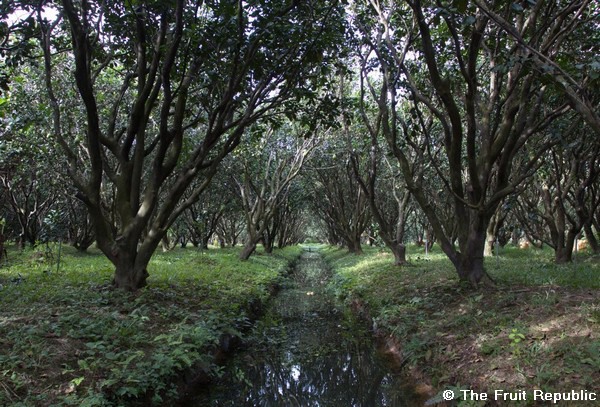 Pomelo orchard in the Mekong River Delta
Pomelo orchard in the Mekong River Delta
The Fruit Republic
Sales director: Mr. Jeroen Pasman
Tel: +84 38 469 1850 (whatsapp)
Email: info@thefruitrepublic.com
Website: www.thefruitrepublic.com
